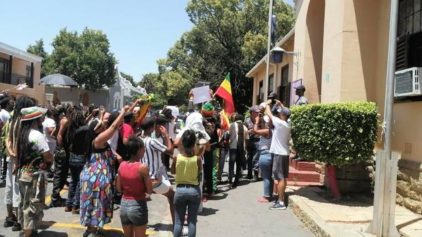South Africa’s Supreme Court of Appeal found that home affairs officials showed “deliberate procrastination” in processing a visa for the Dalai Lama in 2011, which forced the Tibetan spiritual leader to cancel a trip to the country. The Dalai Lama had planned the visit in order to attend Nobel Prize winner Archbishop Desmond Tutu’s 80th birthday celebration, but was unable to secure the visa in time. The incident followed a similar situation in 2009, in which the South African government banned the Dalai Lama from attending a Nobel laureates’ peace conference, believing the visit to be a perceived distraction from the 2010 World Cup.
The court decision said that former home affairs minister Nkosazana Dlamnini-Zuma “unreasonably delayed her decision whether to grant or withhold the visas … and in so doing acted unlawfully.” The apparent discrimination against the Dalai Lama has been believed to be the result of pressure from China, South Africa’s largest trading partner.
Tutu lashed out at the government last year, calling the government’s procrastination “a total betrayal of our struggle history,” and claiming the current administration is “worse than the apartheid government” due to their “shamelessly succumbing to Chinese pressure.”
The court’s decision pleased the Office of Tibet in Pretoria, who say the spiritual leader still wants to visit South Africa. “We believe this will open the door for His Holiness to visit South Africa,” Tibet’s representative for Africa Migyur Dorjee told The Telegraph. “He is looking forward to seeing Nelson Mandela again. He has lots and lots of friends in South Africa.”
South African Leaders accepted the ruling, but have not announced an immediate course of action. “The Department of Home Affairs has noted judgement handed down today on the Dalai Lama matter. In line with our Constitution, the department respects the ruling of the Supreme Court in this regard.” Jackie McKay, deputy director general for immigration for the department, said according to AllAfrica. “However the Minister of Home Affairs Naledi Pandor and the department will study the reasoning for the judgement before responding comprehensively to this matter.”


